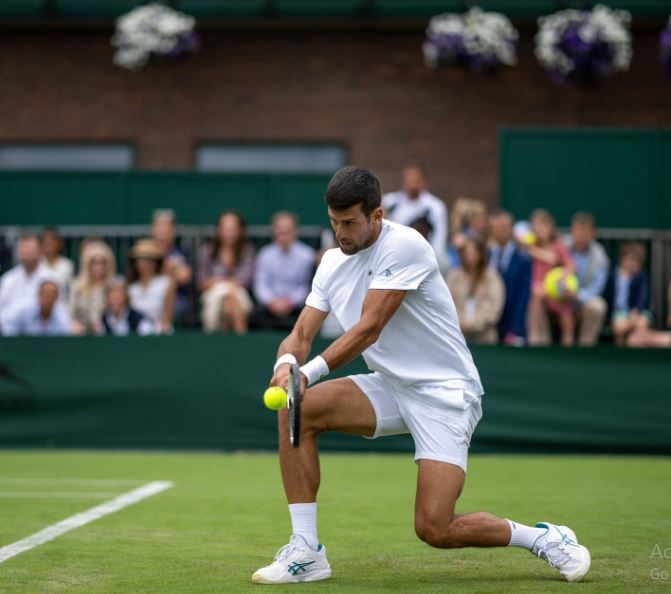Wimbledon: Novak Djokovic’s experience was on display at Wimbledon Monday. And so was Russian teenager Mirra Andreeva’s inexperience.
Djokovic, a seven-time champion at the All England Club who is looking for his 24th Grand Slam title overall, reached the quarterfinals at the grass-court major for the 14th time by beating Hubert Hurkacz 7-6 (6), 7-6 (6), 5-7, 6-4 in a match that started Sunday on Centre Court.
Djokovic saved three set points in the first set and then was two points from losing the second set. Play was then suspended because of the late hour. Monday, Hurkacz finally managed to pick up a set, using his strong serve to near perfection.
“Honestly, I don’t recall the last time I felt this miserable in returning games … Due to his incredibly accurate and powerful serve,” Djokovic said on court. “He’s got one of the best serves in the world and it’s so difficult to read it.”
Hurkacz had held his serve for all 67 games at Wimbledon this year until the fourth set, when Djokovic broke him to lead 4-3. Before that, the 17th-seeded Pole had saved all 18 break points he faced.
Djokovic reached the quarterfinals at a Grand Slam tournament for the 56th time in his career, second only to Roger Federer’s men’s record 58. He will next face Andrey Rublev for a spot in the semifinals.
Andreeva, a Russian qualifier who is still only 16 years old, had been showing her maturity throughout the first week of the Wimbledon tournament but things went awry on Monday. The teenager had won all six of her matches on grass to reach the fourth round at the All England Club but she let a big lead over 25th-seeded Madison Keys slip away in a 3-6, 7-6 (4), 6-2 loss on No. 2 Court.
Andreeva took the first set and led 3-0 in the second — winning nine of 10 games in one stretch — before Keys turned things around. Frustrated at one point, Andreeva threw her racket and received a warning from Swedish chair umpire Louise Azemar Engzell.
In the final game, Andreeva slipped while going for a ball and the racket again went flying out of her hand.
Engzell docked the Russian a point for a second thrown racket, giving Keys a match point. Andreeva argued the call, pleading her case.
“I didn’t throw the racket. I fell,” Andreeva told Engzell. “I slid and then I fell.”
The call stood, however, and Keys then finished off the match to reach the Wimbledon quarterfinals for the first time since 2015.
“Coming out here, you know that she’s a really great player. But you don’t want to be the player that loses to her for her to get to her first quarter,” Keys said on court. “I’ve fallen short a few times and it’s great to be back in the quarterfinals here at Wimbledon.”
Keys has reached the semifinals at the other three Grand Slam tournaments, including a run to the final at the U.S. Open in 2017, but her only other quarterfinal appearance at the All England Club ended at that stage.
Andreeva, the latest teen sensation in tennis, was the youngest player in the Wimbledon draw. She was bidding to become the youngest player to reach the Wimbledon quarterfinals since Anna Kournikova in 1997.
Keys will next play Aryna Sabalenka, who defeated No. 21 Ekaterina Alexandrova 6-4, 6-0. The second-seeded Sabalenka won the Australian Open this year and has a 16-1 record in major tournaments in 2023.
Defending champion Elena Rybakina also reached the quarterfinals. She advanced when Beatriz Haddad Maia retired from their match with a lower back injury with Rybakina leading 4-1.
Also in the men’s tournament, Chris Eubanks reached the quarterfinals in his first Wimbledon appearance, beating fifth-seeded Stefanos Tsitsipas 3-6, 7-6 (4), 3-6, 6-4, 6-4. He will next face third-seeded Daniil Medvedev, who advanced when Jiri Lehecka retired from their match with the Russian leading 6-4, 6-2.
Later Monday, two-time Wimbledon champion Petra Kvitova was playing 2022 finalist Ons Jabeur and top-seeded Carlos Alcaraz will face 2021 finalist Matteo Berrettini.
AP
